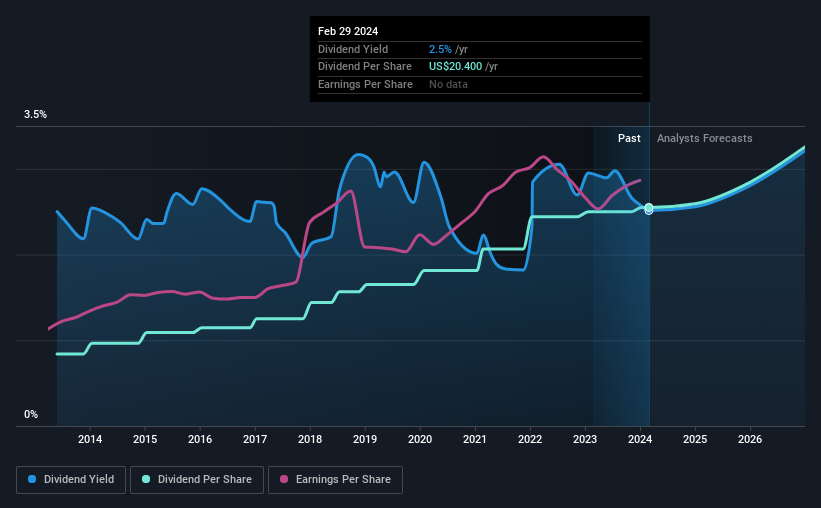Stock Analysis
- United States
- /
- Capital Markets
- /
- NYSE:BLK
Four Days Left Until BlackRock, Inc. (NYSE:BLK) Trades Ex-Dividend

Readers hoping to buy BlackRock, Inc. (NYSE:BLK) for its dividend will need to make their move shortly, as the stock is about to trade ex-dividend. The ex-dividend date is one business day before the record date, which is the cut-off date for shareholders to be present on the company's books to be eligible for a dividend payment. The ex-dividend date is an important date to be aware of as any purchase of the stock made on or after this date might mean a late settlement that doesn't show on the record date. Therefore, if you purchase BlackRock's shares on or after the 6th of March, you won't be eligible to receive the dividend, when it is paid on the 22nd of March.
The company's next dividend payment will be US$5.10 per share, on the back of last year when the company paid a total of US$20.40 to shareholders. Calculating the last year's worth of payments shows that BlackRock has a trailing yield of 2.5% on the current share price of US$811.34. We love seeing companies pay a dividend, but it's also important to be sure that laying the golden eggs isn't going to kill our golden goose! As a result, readers should always check whether BlackRock has been able to grow its dividends, or if the dividend might be cut.
See our latest analysis for BlackRock
If a company pays out more in dividends than it earned, then the dividend might become unsustainable - hardly an ideal situation. BlackRock paid out more than half (54%) of its earnings last year, which is a regular payout ratio for most companies.
Generally speaking, the lower a company's payout ratios, the more resilient its dividend usually is.
Click here to see the company's payout ratio, plus analyst estimates of its future dividends.

Have Earnings And Dividends Been Growing?
Companies with consistently growing earnings per share generally make the best dividend stocks, as they usually find it easier to grow dividends per share. If earnings decline and the company is forced to cut its dividend, investors could watch the value of their investment go up in smoke. With that in mind, we're encouraged by the steady growth at BlackRock, with earnings per share up 6.6% on average over the last five years.
Another key way to measure a company's dividend prospects is by measuring its historical rate of dividend growth. In the last 10 years, BlackRock has lifted its dividend by approximately 12% a year on average. It's encouraging to see the company lifting dividends while earnings are growing, suggesting at least some corporate interest in rewarding shareholders.
The Bottom Line
Should investors buy BlackRock for the upcoming dividend? Earnings per share have been growing at a reasonable rate, and the company is paying out a bit over half its earnings as dividends. We're unconvinced on the company's merits, and think there might be better opportunities out there.
If you're not too concerned about BlackRock's ability to pay dividends, you should still be mindful of some of the other risks that this business faces. Every company has risks, and we've spotted 1 warning sign for BlackRock you should know about.
If you're in the market for strong dividend payers, we recommend checking our selection of top dividend stocks.
Valuation is complex, but we're helping make it simple.
Find out whether BlackRock is potentially over or undervalued by checking out our comprehensive analysis, which includes fair value estimates, risks and warnings, dividends, insider transactions and financial health.
View the Free AnalysisHave feedback on this article? Concerned about the content? Get in touch with us directly. Alternatively, email editorial-team (at) simplywallst.com.
This article by Simply Wall St is general in nature. We provide commentary based on historical data and analyst forecasts only using an unbiased methodology and our articles are not intended to be financial advice. It does not constitute a recommendation to buy or sell any stock, and does not take account of your objectives, or your financial situation. We aim to bring you long-term focused analysis driven by fundamental data. Note that our analysis may not factor in the latest price-sensitive company announcements or qualitative material. Simply Wall St has no position in any stocks mentioned.
About NYSE:BLK
Solid track record established dividend payer.

